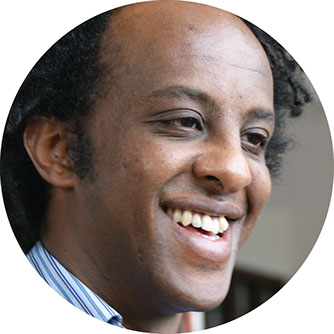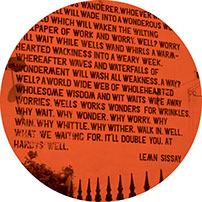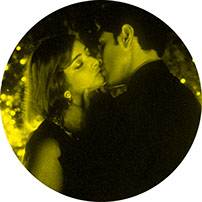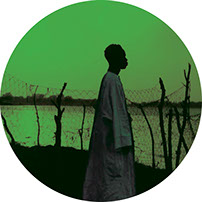N O T E S F R O M T H E S O U T H
 A Quiet Revolution
A Quiet Revolution
Peter Machen speaks to Dinaw Mengestu about his debut novel Children of the Revolution which has enjoyed critical and commercial success around the world
Dinaw Mengestu was born in 1978 in Ethiopa and left for the United States two years later, escaping a bloody civil war that claimed the lives of hundreds of thousands of his countrymen. And now, after three decades of being not American, not quite African – and having published a hugely successful novel which details, with a slightly unnerving blend of detachment and pathos, the life of an Ethiopian immigrant who runs a convenience store in the Unites State – he lives in Paris, following in the tradition of many successful artists and novelists from both America and Africa.
“So you're now Parisian?” I ask him laughingly, in the knowledgeable that no-one ever becomes a Parisian. He laughs back. “I'll never be a Parisian. I'll sort of occupy this strange middle ground of being black in France but not being a sort of troublesome black because I'm not from a former French colony. When I speak French I speak it with an American accent, which makes everybody feel sort of like, 'he's fine. We don't have to worry about how long his visa's for'. So I'll never be a Parisian. I'll just be a guy in Paris.”
Mengestu says all of this lightly. For the impossibility of becoming a Parisian is a universal, experience, although race does of course – and why do we still have to write 'of course?' – inform that experience. The possibility of becoming American is a different thing though, layered with far more complexities and contradictions, as befits a single landmass straining – with its always valedictory notes – to be a country. And the place of the immigrant in America is one of America's core artistic concerns. It is after all a country of immigrants in which immigration control is a major political issue.
It is to Mengestu's credit that his book – which has achieved critical and commercial success as well as a slew of awards – doesn't feel like a story about immigrant life, although it is at every turn. Instead it feels far more like the story of a man quietly at war with his own reality, the story of a man who can't quite discern the different resonances of triumph and defeat.
The convincing rendition of his protagonist is all the more impressive considering that Mengestu is only 30, nearly two decades younger than Sepho whose experiences constitute the novel and whose existential crisis is never labeled as such but is instead carefully observed and catalogued in a way that is almost strangely gripping.
The authenticity with which Mengestu inhabits his lead character had me convinced that the novel was based on someone he knew, but the plot lines of Children of the Revolution are all of his own making. “It was kind of a mix,” he says, “I'd heard all these fragments of different narratives from different people in my life, so I always knew the bare-bones structure of what happened in Ethiopia during that time period. And then, as I got a little bit older, I researched it, so I knew it like a historian, in great detail. But I didn't have any narratives or stories.”
Then when he was in college, he started asking family members – as part of an oral history project – just exactly what had happened to them. “And that's when people started to fill in those spaces that we just don't know about when we have our articles in front of us and the personal gets lost.” Mengestu didn't do anything with those histories for many years. But when he began writing his novel, they ended up informing his imagination. Although there is nothing in the book that is taken directly from those stories, he says that wouldn't have had “the freedom to imagine his narrative” without them.
Talking about the book's conception, Mengestu describes walking down a street in Washington DC one night. He'd been working for years on “a silly novel that never went anywhere”. “And I saw this middle-aged Ethiopian man behind the counter of a very small little grocery store. And right away this sentence came into my head about this voice. And once I had that voice in my head, the rest of it sort of filled itself in.”
“But I think I had a deep sense of where he was at that point in his life – just from having seen other men in my life pass through those stages when they're past their youth and they haven't quite accepted that this is all their life has become and it's not going to change any time soon”.
“It's a really hard acknowledgment and I think that's what sort of forces that melancholy and that sense of stasis. I don't think he's depressed. I think he's melancholy. It's a persistent thing, not just something he snaps in and out of.”
The Washington Post called Children of the Revolution – or The Beautiful Things that Heaven Bears as it is known in the United States – “a great American novel, a great African novel and a great Washington novel”. I ask Mengestu how comfortable he is with these three layers of greatness. He says that the words came from “a very conscious critic who” – Mengestu thinks – “wanted to make sure that the book had a space in America and didn't get pushed into the African literature category” which would have signaled its commercial death. “So that construction of the African novel, the American novel and the DC novel, was to show that Africa sort of exists inside of DC and DC exists inside of America and all these spaces aren't separated the way we like to think they are.”
At the same time, the book does feel like it is written against the landscape of the great American Novel, reminding me – without any substantial justification – of Saul Bellows and also Michael Chabon. I mention Bellows' name to Mengestu, thinking that I'm stabbing in the dark, but he says he “loves Bellows”. And anyone who loves Bellows will probably struggle to excise him when writing, so I'm not far off. He points out that Bellows was also in fact writing about the diasporic experience. And like Bellows' protagonists, Mengestu's Sepho is concerned with his own hollowness.
But then who – on occasion is not. This timeless condition – so magnified by modernity – sits at the heart of Mengestu's book in which quietly personal metaphysics are weighed down by centuries and continents which are in turn weighed down by the anxieties of the self, which are – in their own ways – infinitely heavier.

More
Writing
© 2017 Peter Machen. All rights reserved About Contact Peter Machen Web design: The Communication Factory


